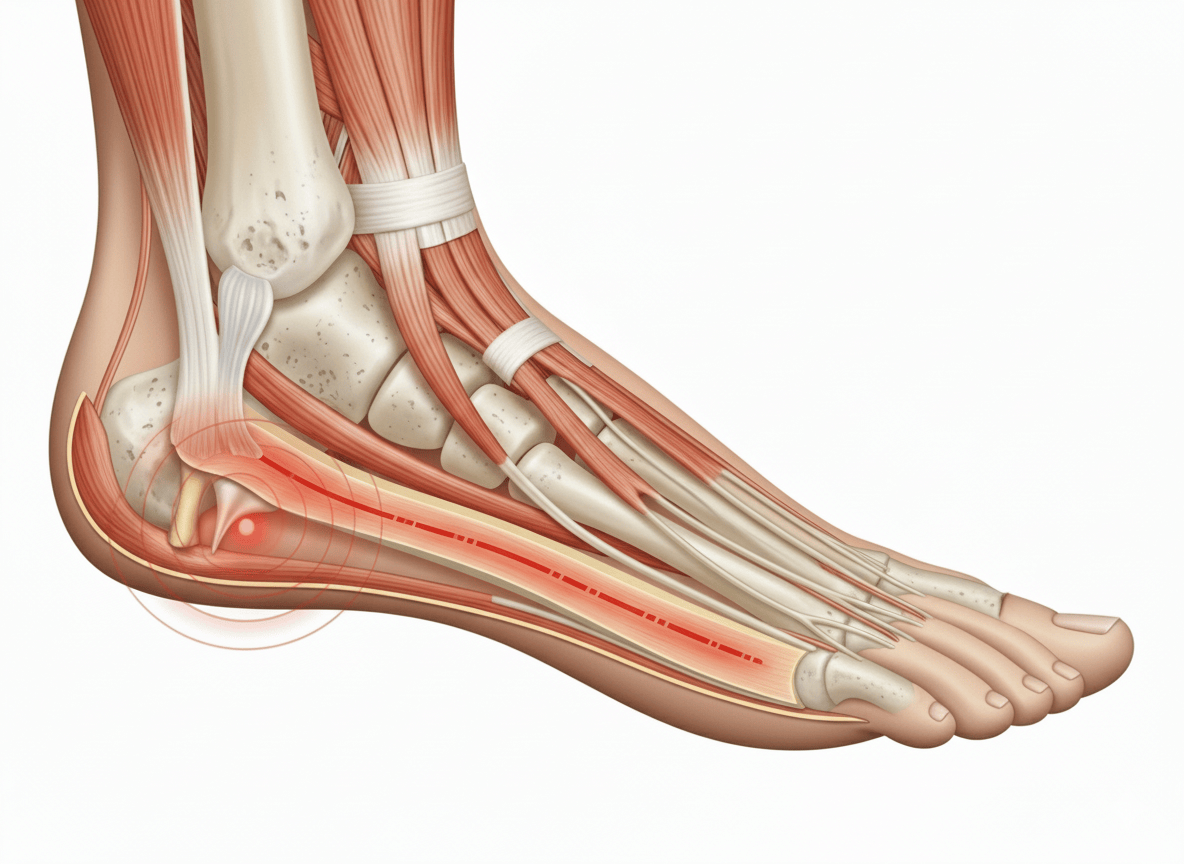Plantar Fasciitis
What is Plantar Fasciitis?
That sharp, stabbing pain in your heel with your first steps in the morning is a telltale sign of Plantar Fasciitis. This common but painful condition is caused by inflammation of the plantar fascia, the thick band of tissue connecting your heel to your toes. It can turn simple activities like walking or standing into a painful ordeal.
At City Orthopaedics & Sports Medicine, our team of foot and ankle specialists has extensive experience in diagnosing and effectively treating all forms of heel pain, creating personalized plans to get you back to your activities pain-free.
Root Causes of Plantar Fasciitis
Plantar fasciitis occurs when the plantar fascia ligament is overstressed and becomes inflamed. Our specialists identify several common triggers and risk factors:
- Foot Structure (Biomechanics): Having flat feet (overpronation) or high arches (supination) can distribute weight unevenly, putting excess tension on the fascia.
- Improper or Worn-Out Footwear: Shoes that lack proper arch support or have worn-out cushioning fail to protect the foot.
- Activity Level: A sudden increase in physical activity, such as starting a new running program or a job that requires long hours of standing.
- Tight Muscles: A tight Achilles tendon and tight calf muscles can pull on the heel and increase strain on the plantar fascia.
- Body Weight: Excess weight places significant, constant stress on the plantar fascia with every step.
Symptoms of Plantar Fasciitis
You may be suffering from this condition if you experience any of the following signs:
- Sharp pain at the bottom of your heel.
- Pain that is most severe with your first few steps in the morning or after long periods of rest.
- Pain in the arch of your foot.
- Increased foot pain when walking or standing for long periods.
- Discomfort that eases during the day but returns after extended activity.
Diagnosing Plantar Fasciitis: A Comprehensive Evaluation
A correct diagnosis is the first step toward effective treatment. Our specialists use a thorough, hands-on approach to confirm Plantar Fasciitis and rule out other conditions. Your evaluation will include:
- A Detailed Physical Exam: Your specialist will assess your foot’s structure, check for tenderness in the heel and arch, and test the flexibility of your Achilles tendon.
- Gait Analysis: Observing how you walk provides critical information about the biomechanics of your feet and how they may be contributing to the problem.
- Imaging (If Necessary): While a physical exam is often enough for a diagnosis, we may recommend an X-ray or MRI to rule out other causes of your heel pain, such as a stress fracture or a pinched nerve. This ensures your treatment plan is targeting the precise source of the problem.
Treatment for Plantar Fasciitis: A Comprehensive Approach
City Orthopaedics & Sports Medicine prioritizes non-surgical treatment options whenever possible, as the vast majority of cases resolve with conservative care. Your personalized plan will focus on relieving pain and addressing the underlying cause.
Non-Surgical Treatment Options:
- Rest, Ice, and Anti-inflammatory Medications: To reduce acute pain and inflammation.
- Stretching and Physical Therapy: A crucial component, focusing on targeted stretches for the plantar fascia and Achilles tendon, as well as strengthening exercises.
- Supportive Footwear: We will provide counseling on choosing shoes with proper arch support and cushioning.
- Custom Orthotics: Our specialists can prescribe custom-molded orthotics to correct biomechanical imbalances, support your arch, and dramatically reduce stress on the fascia.
- Night Splints: Wearing a splint while you sleep keeps the plantar fascia gently stretched, significantly reducing intense morning pain.
- Cortisone Injections: For severe or persistent pain, a targeted injection can deliver powerful anti-inflammatory medication directly to the source of the pain.
Surgical Treatment:
In the rare cases where months of conservative treatment fail to alleviate pain, our surgeons may recommend surgery as a last resort. This surgical option can provide relief when other treatments prove ineffective.
When grappling with discomfort in your back, neck, or any of your musculoskeletal structures, timely and accurate diagnosis is of paramount importance. Dr. Babatunde stands as a distinguished figure in the realm of orthopaedic surgery, adeptly equipped to offer you the professional insight you urgently need. Renowned for his expertise, Dr. Babatunde shines as one of the premier orthopaedic surgeons in the field, ready to guide you towards successful outcomes through surgical treatment and rehabilitation of injuries to the shoulder, elbow, hip, knee, and ankle. Your journey to lasting relief and restored mobility commences with Dr.Babatunde, a trusted expert dedicated to your well-being.



